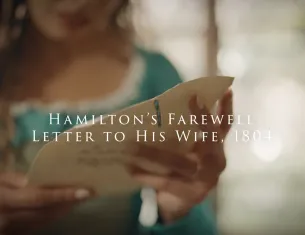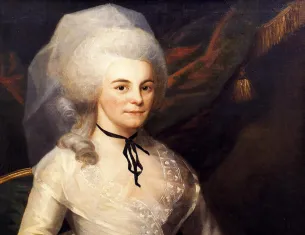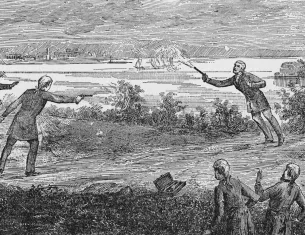Hamilton’s Farewell Letter to His Wife, July 4, 1804

Philippa Soo and Lin-Manuel Miranda as Elizabeth and Alexander Hamilton on the Broadway stage. (Photo Credit: Joan Marcus).
A week before he faced Aaron Burr in the duel, Alexander Hamilton drafted a last letter to his wife. This document gives us insight into how Hamilton viewed his role as a husband and his sense of honor and manhood.
Draft of Alexander Hamilton’s Farewell Letter to Elizabeth Hamilton, July 4, 1804
This letter, my very dear Eliza, will not be delivered to you, unless I shall first have terminated my earthly career; to begin, as I humbly hope from redeeming grace and divine mercy, a happy immortality.
If it had been possible for me to have avoided the interview, my love for you and my precious children would have been alone a decisive motive. But it was not possible, without sacrifices which would have rendered me unworthy of your esteem. I need not tell you of the pangs I feel, from the idea of quitting you and exposing you to the anguish which I know you would feel. Nor could I dwell on the topic lest it should unman me.
The consolations of Religion, my beloved, can alone support you; and these you have a right to enjoy. Fly to the bosom of your God and be comforted. With my last idea; I shall cherish the sweet hope of meeting you in a better world.
Adieu best of wives and best of Women. Embrace all my darling Children for me.
Ever yours
A H
July 4. 1804
Mrs. Hamilton
Source: Alexander Hamilton to Elizabeth Hamilton, July 4, 1804, Founders Online, National Archives. Original source: The Papers of Alexander Hamilton, vol. 26, 1 May 1802 – 23 October 1804, Additional Documents 1774–1799, Addenda and Errata, ed. Harold C. Syrett. New York: Columbia University Press, 1979, p. 293.
Draft of Alexander Hamilton’s Farewell Letter to Elizabeth Hamilton, July 4, 1804
This letter, my very dear Eliza, will not be delivered to you, unless I shall first have terminated my earthly career; to begin, as I humbly hope from redeeming grace and divine mercy, a happy immortality.
If it had been possible for me to have avoided the interview, my love for you and my precious children would have been alone a decisive motive. But it was not possible, without sacrifices which would have rendered me unworthy of your esteem. I need not tell you of the pangs I feel, from the idea of quitting you and exposing you to the anguish which I know you would feel. Nor could I dwell on the topic lest it should unman me.
The consolations of Religion, my beloved, can alone support you; and these you have a right to enjoy. Fly to the bosom of your God and be comforted. With my last idea; I shall cherish the sweet hope of meeting you in a better world.
Adieu best of wives and best of Women. Embrace all my darling Children for me.
Ever yours
A H
July 4. 1804
Mrs. Hamilton
Source: Alexander Hamilton to Elizabeth Hamilton, July 4, 1804, Founders Online, National Archives. Original source: The Papers of Alexander Hamilton, vol. 26, 1 May 1802 – 23 October 1804, Additional Documents 1774–1799, Addenda and Errata, ed. Harold C. Syrett. New York: Columbia University Press, 1979, p. 293.
grace - mercy, freely give love of God
divine - from God
pangs - longings, distress
anguish - suffering, pain
lest - for fear
Adieu - good-bye in French
Background
A week before he faced Aaron Burr in the duel, Alexander Hamilton drafted a last letter to his wife. This document gives us insight into how Hamilton viewed his role as a husband and his sense of honor and manhood.
Transcript
Draft of Alexander Hamilton’s Farewell Letter to Elizabeth Hamilton, July 4, 1804
This letter, my very dear Eliza, will not be delivered to you, unless I shall first have terminated my earthly career; to begin, as I humbly hope from redeeming grace and divine mercy, a happy immortality.
If it had been possible for me to have avoided the interview, my love for you and my precious children would have been alone a decisive motive. But it was not possible, without sacrifices which would have rendered me unworthy of your esteem. I need not tell you of the pangs I feel, from the idea of quitting you and exposing you to the anguish which I know you would feel. Nor could I dwell on the topic lest it should unman me.
The consolations of Religion, my beloved, can alone support you; and these you have a right to enjoy. Fly to the bosom of your God and be comforted. With my last idea; I shall cherish the sweet hope of meeting you in a better world.
Adieu best of wives and best of Women. Embrace all my darling Children for me.
Ever yours
A H
July 4. 1804
Mrs. Hamilton
Source: Alexander Hamilton to Elizabeth Hamilton, July 4, 1804, Founders Online, National Archives. Original source: The Papers of Alexander Hamilton, vol. 26, 1 May 1802 – 23 October 1804, Additional Documents 1774–1799, Addenda and Errata, ed. Harold C. Syrett. New York: Columbia University Press, 1979, p. 293.
Excerpt
Draft of Alexander Hamilton’s Farewell Letter to Elizabeth Hamilton, July 4, 1804
This letter, my very dear Eliza, will not be delivered to you, unless I shall first have terminated my earthly career; to begin, as I humbly hope from redeeming grace and divine mercy, a happy immortality.
If it had been possible for me to have avoided the interview, my love for you and my precious children would have been alone a decisive motive. But it was not possible, without sacrifices which would have rendered me unworthy of your esteem. I need not tell you of the pangs I feel, from the idea of quitting you and exposing you to the anguish which I know you would feel. Nor could I dwell on the topic lest it should unman me.
The consolations of Religion, my beloved, can alone support you; and these you have a right to enjoy. Fly to the bosom of your God and be comforted. With my last idea; I shall cherish the sweet hope of meeting you in a better world.
Adieu best of wives and best of Women. Embrace all my darling Children for me.
Ever yours
A H
July 4. 1804
Mrs. Hamilton
Source: Alexander Hamilton to Elizabeth Hamilton, July 4, 1804, Founders Online, National Archives. Original source: The Papers of Alexander Hamilton, vol. 26, 1 May 1802 – 23 October 1804, Additional Documents 1774–1799, Addenda and Errata, ed. Harold C. Syrett. New York: Columbia University Press, 1979, p. 293.
grace - mercy, freely give love of God
divine - from God
pangs - longings, distress
anguish - suffering, pain
lest - for fear
Adieu - good-bye in French


